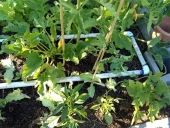D Nikolls wrote:
Purity Lopez wrote:wood chips have even more toxins than straw, and can carry disease. If you have time, please let me know what you end up doing.
Do you have more info to.share re: toxins in woodchips?
I have met plenty of people who have had issues with herbicides in straw or manure, I've not yet met one who had encountered a toxicity issue with woodchips! Cedar can be an issue for some uses, but I wouldn't call it toxic..
When I did research on the subject, probably five or more years ago there were several things that caught my attention. First of all, as background on me and the way I run my farm.....not much is allowed to come from outside. I try to keep it to a minimum. So for instance, I don't buy plants because I don't know what they are bringing with them. So I was looking for any flags concerning using wood chips that might cause me later problems. And you know yourself, those kinds of problems can turn into nightmares.
Here is what I found out.
We don't know what kinds of trees have been ground up as chips...did they put in black walnut for instance? Allelopathy is “the suppression of growth of one plant species by another due to the release of toxic substances.” So unless we are 100% certain what trees are in the wood mulch, we might inadvertently kill our tomatoes. And should the tree trimming service have black walnut in the mix, our tomatoes are going to die! Wood chips can seriously disturb your soil ph level because you don't normally know what trees have been used or the ratio.
Or was the tree diseased? I found this out the hard way, not from chips but from compost. I bought ECO compost one year and I started having all kinds of disease problems. I contacted ECO, they were a new company at that time and after long conversations with them I found out they were not using a high enough temperature to compost any disease out.
In my area, all chips come from the tree/bush refuse pile at the dump - and I've seen first hand that not just tree wood was in those piles...there was also OSB and other crap like dead oleander branches that could have been easily chipped as the branches were huge.
Second: Long term nitrogen deficiency can occur using chips in the vegetable garden.
Third: To offset the high carbon to nitrogen ratio in wood chips, you need what I see as unfathomable amounts of composted manure. Vegetables need to have the delicate balance of their Carbon to Nitrogen ratio (C:N) preserved at 30:1 or lower. Fresh wood mulch has over 3 times that much carbon! So I see homemade compost being a much safer choice.
Fourth: Another problem, sometimes referred to as “sour mulch” or “toxic mulch,” occurs when mulch is left in large piles and undergoes anaerobic conditions. This results in the production of acids and other compounds that can volatilize when the mulch is placed in beds, especially during hot weather. These vapors can quickly damage annuals and other sensitive plants.
This was copied out of my files that I kept from researching on the net. The overall consensus was that if someone decides to use wood chips, they should compost them for at least 6 months before using them





 3
3




 2
2








 1
1




 2
2









